#learn mandarin
Text
my Mandarin teacher has been giving us tongue twisters recently to help our pronunciation so I thought I'd share them:
first the classic:
四是四,十是十,
十四是十四,
四十是四十,
他们不是四十四
(sì shì sì , shí shì shí,
shí sì shì shí sì,
sì shí shì sì shí,
tā men bùshì sì shí sì)
four is four, ten is ten,
fourteen is fourteen,
forty is forty,
they are not forty-four
and then these two specifically focused on nasal finals:
青青山上一根藤,
青藤底下挂铜铃,
风吹藤动铜铃动,
风停藤停铜铃停
(qīngqīng shān shàng yì gēn téng,
qīng téng dǐ xià guà tóng líng,
fēng chuī téng dòng tóng líng dòng,
fēng tíng téng tíng tóng líng tíng)
On a green mountain there is a vine,
Under the green vine hang copper bells.
The wind blows, the vine moves, the copper bells move.
The wind stops, the vine stops, the copper bells stop.
扁担长,板凳宽,
扁担要绑在板凳上,
板凳不让扁担绑在板凳上,
扁担偏要绑在板凳上。
(biǎn dan cháng, bǎn dèng kuān,
biǎn dan yào bǎng zài bǎn dèng shàng,
bǎn dèng bú ràng biǎn dan bǎng zài bǎn dèng shàng,
biǎn dan piān yào bǎng zài bǎn dèng shàng)
The bamboo pole is long, and the wooden bench is wide,
The bamboo pole wants to be tied to the wooden bench,
The wooden bench doesn't let the bamboo pole be tied to it,
But the bamboo pole insists on being tied to the wooden bench
#i'll update as she gives us more#mandarin#tongue twisters#learn mandarin#chinese#learn chinese#langblr#chinese langblr
333 notes
·
View notes
Text
75 essential single-character verbs (单字动词)

When I started consuming more native Chinese content, I quickly discovered an area in which my knowledge was lacking: single-character verbs. In my experience, it’s very easy to focus on learning words consisting of two or more characters and overlook single-character words.
Driven by curiosity, I went through my Anki deck (and also wracked my brain) to generate a list of characters/words that I have learned over the past couple years (roughly). Then I selected 75 verbs that are fairly common and important to know. They skew towards intermediate and advanced vocabulary.
Definitions are from MDBG. For characters with additional meanings that I am not yet familiar with, I have bolded the meanings I want to share.
(1) 抢 qiǎng - to fight over / to rush / to scramble / to grab / to rob / to snatch
(2) 救 jiù - to save / to assist / to rescue
(3) 扶 fú - to support with the hand / to help sb up / to support oneself by holding onto something / to help
(4) 催 cuī - to urge / to press / to prompt / to rush sb / to hasten sth / to expedite
(5) 夹 jiā - to press from either side / to place in between / to sandwich / to carry sth under armpit / wedged between / between / to intersperse / to mix / to mingle / clip / folder / Taiwan pr. [jia2]
(6) 咬 yǎo - to bite / to nip
(7) 砸 zá - to smash / to pound / to fail / to muck up / to bungle
(8) 毁 huǐ - to destroy / to ruin / to defame / to slander
(9) 嚷 rǎng - to shout / to bellow / to make a big deal of sth / to make a fuss about sth
(10) 塞 sāi - to stop up / to squeeze in / to stuff / cork / stopper
(11) 贪 tān - to have a voracious desire for / to covet / greedy / corrupt
(12) 拆 chāi - to tear open / to tear down / to tear apart / to open
(13) 掏 tāo - to fish out (from pocket) / to scoop
(14) 跪 guì - to kneel
(15) 摘 zhāi - to take / to borrow / to pick (flowers, fruit etc) / to pluck / to select / to remove / to take off (glasses, hat etc)
(16) 拎 līn - to lift up / to carry in one's hand / Taiwan pr. [ling1]
(17) 扛 káng - to carry on one's shoulder / (fig.) to take on (a burden, duty etc)
(18) 拽 zhuài - to pull / to tug at (sth)
(19) 愣 lèng - to look distracted / to stare blankly / distracted / blank / (coll.) unexpectedly / rash / rashly
(20) 搂 lǒu - to hug / to embrace / to hold in one's arms
(21) 垮 kuǎ - to collapse (lit. or fig.)
(22) 撑 chēng - to support / to prop up / to push or move with a pole / to maintain / to open or unfurl / to fill to bursting point / brace / stay / support
(23) 甩 shuǎi - to throw / to fling / to swing / to leave behind / to throw off / to dump (sb)
(24) 围 wéi - to encircle / to surround / all around / to wear by wrapping around (scarf, shawl)
(25) 愁 chóu - to worry about
(26) 插 chā - to insert / stick in / pierce / to take part in / to interfere / to interpose
(27) 漏 lòu - to leak / to divulge / to leave out by mistake / waterclock or hourglass (old)
(28) 披 pī - to drape over one's shoulders / to open / to unroll / to split open / to spread out
(29) 歇 xiē - to rest / to take a break / to stop / to halt / (dialect) to sleep / a moment / a short while
(30) 抄 chāo - to make a copy / to plagiarize / to search and seize / to raid / to grab / to go off with / to take a shortcut / to make a turning move / to fold one's arms
(31) 哼 hēng - to groan / to snort / to hum / to croon / humph!
(32) 哄 hǒng - to deceive / to coax / to amuse (a child)
(33) 啃 kěn - to gnaw / to nibble / to bite
(34) 眯 mī - to narrow one's eyes / to squint / (dialect) to take a nap
(35) 趴 pā - to lie on one's stomach / to lean forward, resting one's upper body (on a desktop etc) / (Tw) percent
(36) 揍 zòu - to hit / to beat (sb) / (coll.) to smash (sth)
(37) 蹭 cèng - to rub against / to walk slowly / (coll.) to freeload
(38) 凑 còu - to gather together, pool or collect / to happen by chance / to move close to / to exploit an opportunity
(39) 敲 qiāo - to hit / to strike / to tap / to rap / to knock / to rip sb off / to overcharge
(40) 滑 huá - to slip / to slide / slippery / smooth / sly / slippery / not to be trusted
(41) 碎 suì - to break down / to break into pieces / fragmentary
(42) 盯 dīng - to watch attentively / to fix one's attention on / to stare at / to gaze at
(43) 塌 tā - to collapse / to droop / to settle down
(44) 背 bēi - to be burdened / to carry on the back or shoulder
背 bèi - the back of a body or object / to turn one's back / to hide something from / to learn by heart / to recite from memory / unlucky (slang) / hard of hearing
(45) 数 shǔ - to count / to count as / to regard as / to enumerate (sb's shortcomings)
(46) 按 àn - to press / to push / to leave aside or shelve / to control / to restrain / to keep one's hand on / to check or refer to / according to / in the light of / (of an editor or author) to make a comment
(47) 压 yā - to press / to push down / to keep under (control) / pressure
(48) 亲 qīn - parent / one's own (flesh and blood) / relative / related / marriage / bride / close / intimate / in person / first-hand / in favor of / pro- / to kiss / (Internet slang) dear
(49) 补 bǔ - to repair / to patch / to mend / to make up for / to fill (a vacancy) / to supplement
(50) 舔 tiǎn - to lick / to lap
(51) 拼 pīn - to piece together / to join together / to stake all / adventurous / at the risk of one's life / to spell
(52) 埋 mái - to bury
(53) 抖 dǒu - to tremble / to shake out / to reveal / to make it in the world
(54) 涂 tú - to apply (paint etc) / to smear / to daub / to blot out / to scribble / to scrawl / (literary) mud / street
(55) 抹 mǒ - to smear / to wipe / to erase / classifier for wisps of cloud, light-beams etc
(56) 吞 tūn - to swallow / to take
(57) 拦 lán - to block sb's path / to obstruct / to flag down (a taxi)
(58) 露 lòu - to show / to reveal / to betray / to expose
露 lù - dew / syrup / nectar / outdoors (not under cover) / to show / to reveal / to betray / to expose
(59) 滚 gǔn - to boil / to roll / to take a hike / Get lost!
(60) 扣 kòu - to fasten / to button / button / buckle / knot / to arrest / to confiscate / to deduct (money) / discount / to knock / to smash, spike or dunk (a ball) / to cover (with a bowl etc) / (fig.) to tag a label on sb / (Tw) (loanword) code
(61) 夸 kuā - to boast / to exaggerate / to praise
(62) 挥 huī - to wave / to brandish / to command / to conduct / to scatter / to disperse
(63) 求 qiú - to seek / to look for / to request / to demand / to beseech
(64) 吸 xī - to breathe / to suck in / to absorb / to inhale
(65) 响 xiǎng - echo / sound / noise / to make a sound / to sound / to ring / loud / classifier for noises
(66) 擦 cā - to wipe / to erase / rubbing (brush stroke in painting) / to clean / to polish
(67) 踩 cǎi - to step on / to tread / to stamp / to press a pedal / to pedal (a bike) / (online) to downvote
(68) 撕 sī - to tear
(69) 扫 sǎo - to sweep
(70) 锁 suǒ - to lock / to lock up / a lock (CL:把)
(71) 扎 zhā - to prick / to run or stick (a needle etc) into / mug or jug used for serving beer (loanword from "jar")
(72) 撞 zhuàng - to knock against / to bump into / to run into / to meet by accident
(73) 追 zhuī - to chase / to pursue / to look into / to investigate / to reminisce / to recall / to court (one's beloved) / to binge-watch (a TV drama) / retroactively / posthumously
(74) 抽 chōu - to draw out / to pull out from in between / to remove part of the whole / (of certain plants) to sprout or bud / to whip or thrash
(75) 删 shān - to delete
#vocab list#chinese#mandarin#mandarin chinese#chinese language#studyblr#langblr#language study#learning languages#language learning#chinese studyblr#chinese langblr#mandarin studyblr#mandarin langblr#study chinese#study mandarin#learn chinese#learn mandarin#studying chinese#learning chinese#studying mandarin#learning mandarin#chinese vocab#mandarin vocab#foreign languages#language#languages#language blog#languageblr#language stuff
760 notes
·
View notes
Text
all my mandarin dictionaries (and dictionary-adjacent books)
Through chatting with @don-dake and @cherrymintvampyyri, I've come to realize that I might own a less than normal number of Mandarin dictionaries. So, here's a post about all of them.
I do have two basic bilingual dictionaries (Mandarin/English): the Langenscheidt pocket dictionary and the DK visual dictionary. These are quite easy to buy and not that interesting imo, so I'm not gonna talk further about them.
I'm also going to include a couple books that aren't technically dictionaries, but are rather about etymology of characters, and that's close enough to count for me.
Okay, let's get on to the interesting stuff!
1. What Character is That? An Easy-Access Dictionary of 5,000 Chinese Characters by Ping-gam Go (second edition, 1995)
bilingual
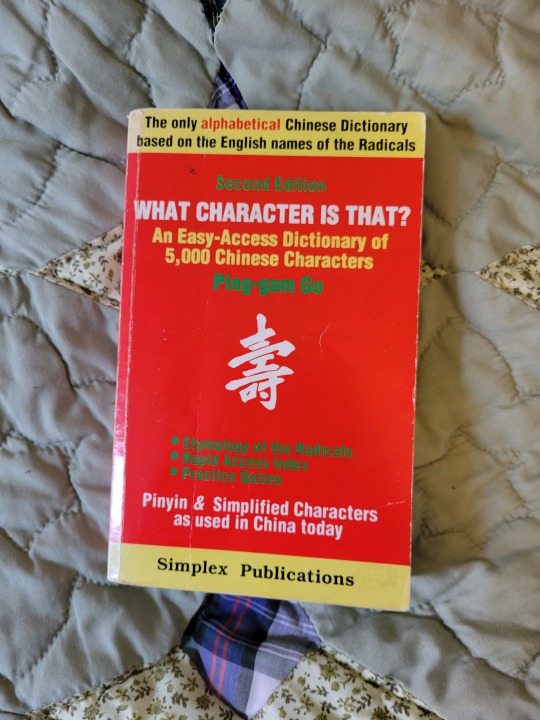
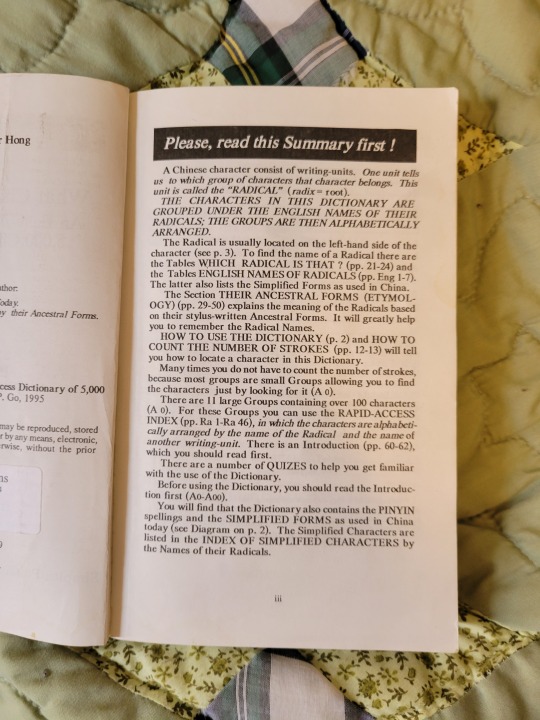
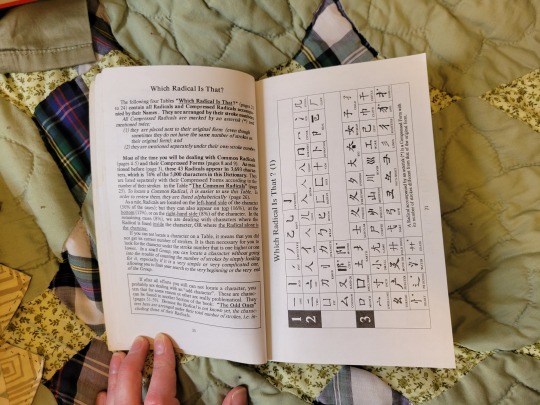
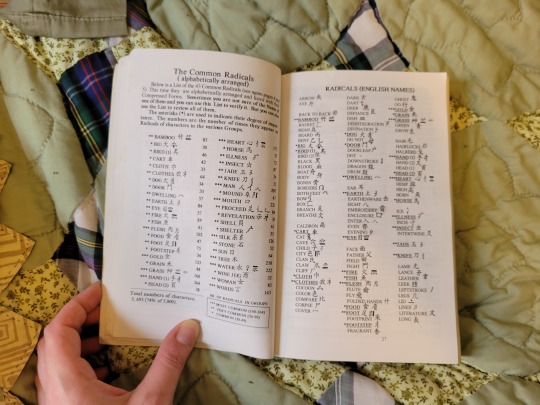
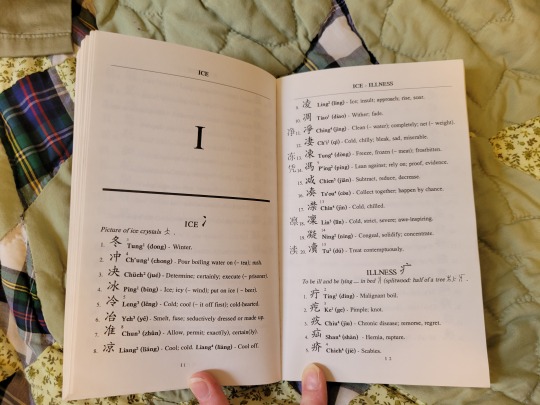
This strange little dictionary was gifted to me by a nun who went to high school with my grandma and later lived in China as a missionary. It's organized alphabetically based on the English translation of each radical?
I have not used this dictionary for actual reference ever, because I flipped through it once and realized that it was absolutely whack. But it's cool to have I guess.
2. 新华字典 第11版
monolingual
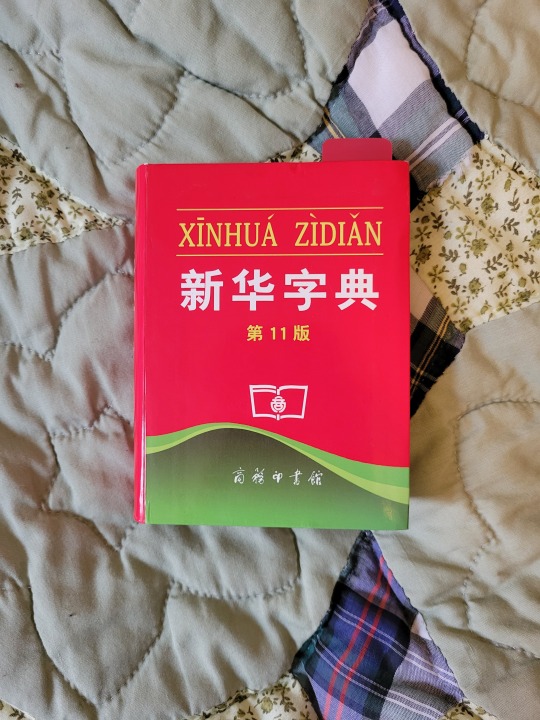
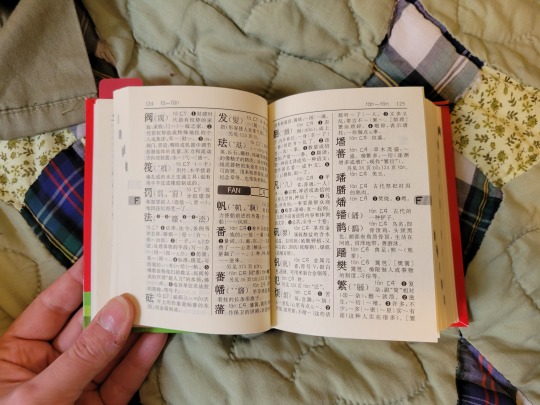
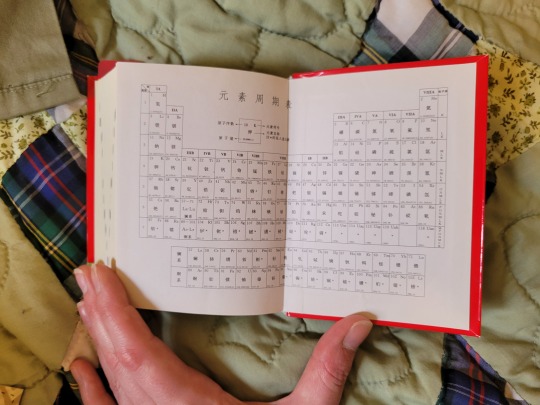
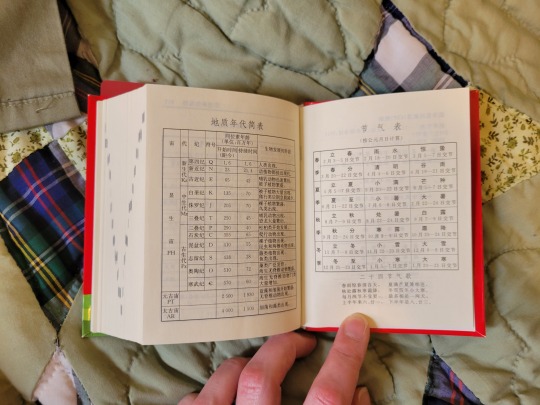
This little guy was gifted to me by a Chinese classmate back when I was in college. It's a 字典, so it's just focused on defining individual characters and providing some words featuring that character. Despite being a mainland dictionary, it also has 注音 next to each character for some reason.
It's got some neat stuff towards the back, like the periodic table and a chart of all the 節氣 solar terms.
3. 小学生全笔顺 同义词 近义词 反义词 组词 造句 成语 多音多义字 词典
monolingual
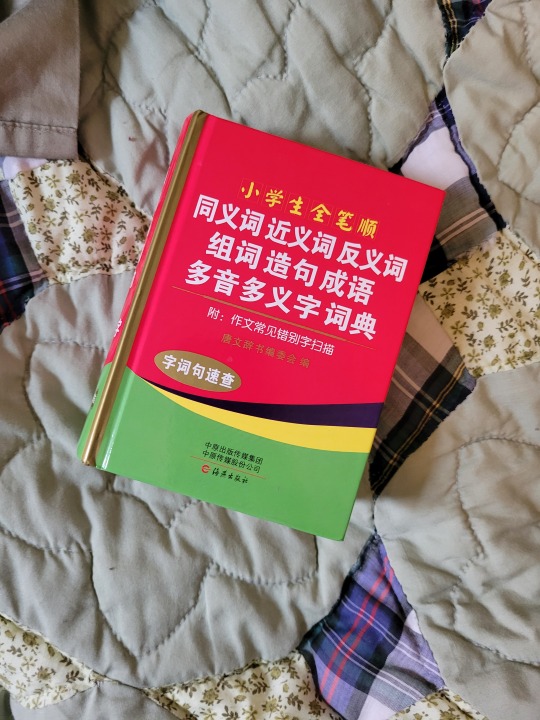
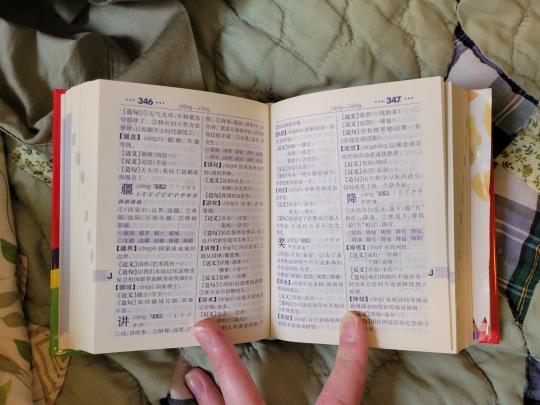
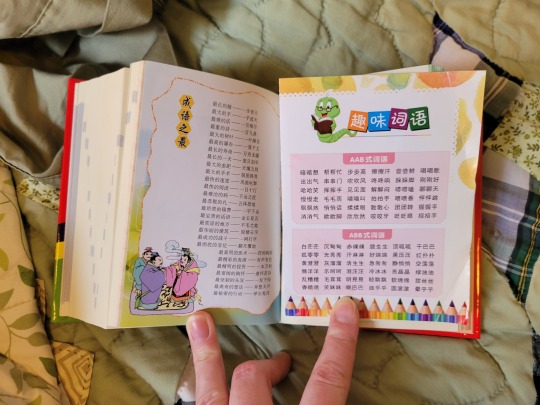
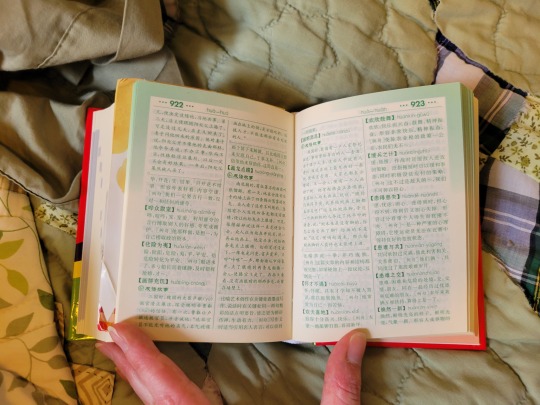
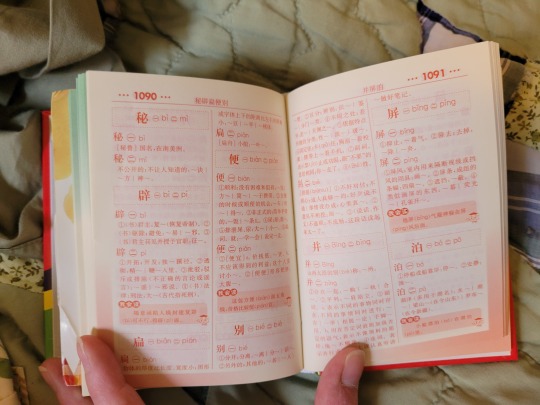
Whew, that's a mouthful. This is an actual 词典, so it defines full words. It also provides example sentences, synonyms, antonyms, and close equivalents. Then there's a section for idioms, and another section for 多音多义字.
There's also this nifty little insert with examples of words/phrases that follow common patterns of repetition.
4. 新现代汉语词典
monolingual
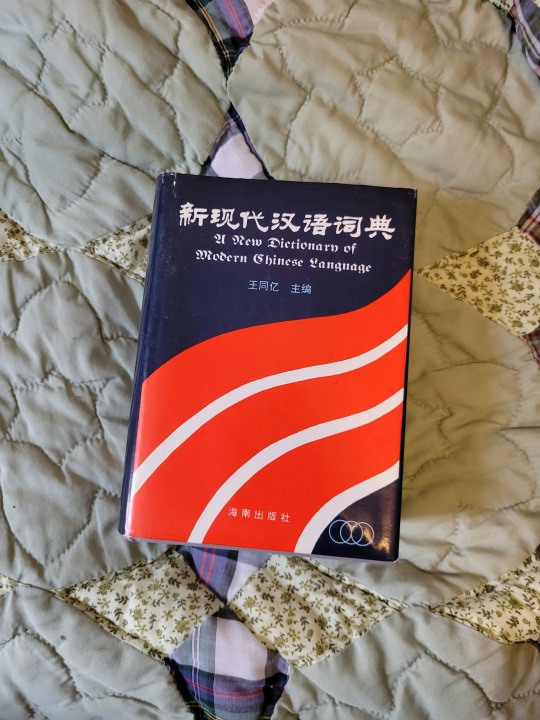
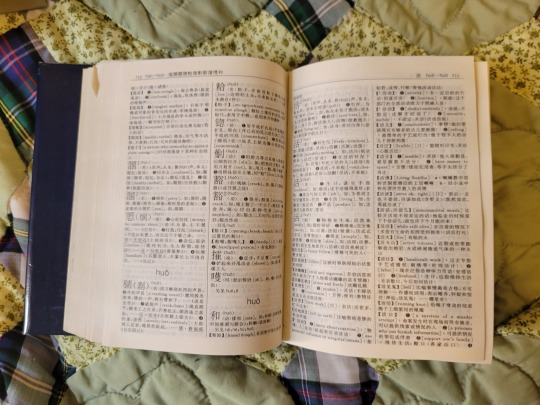
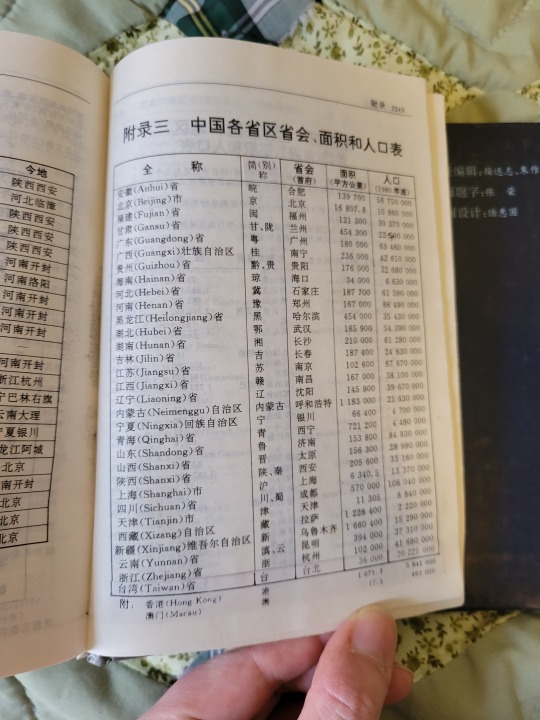
I picked up this chunky guy from a used bookstore down the street from me (the owner of the store passed last year, and the store is no longer there unfortunately). This is a fairly normal dictionary, it's just bigger than my others and has more words listed in it.
One thing I also noticed is that this chart towards the end of the dictionary apparently had a strip of paper pasted on the bottom. It doesn't seem like something I can peel up without damaging the paper under it, and when I shine a flashlight through the page I can't make out any major differences between what's on the sticker and what might be on the page under it. So my best guess is there might have been some damage to the text on the page?
5. 商务馆学汉语近义词词典 The Commercial Press Guide to Chinese Synonyms
monolingual
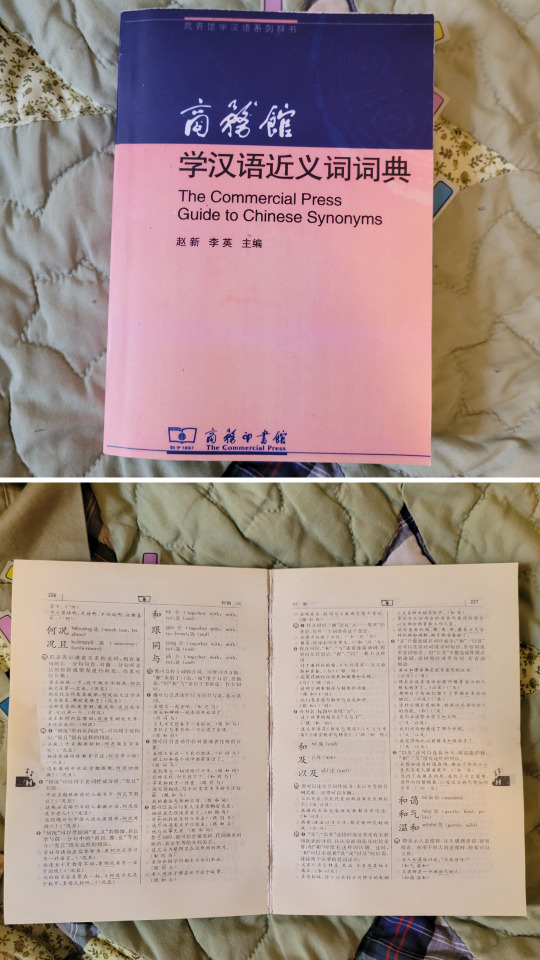
This book is easily the one I reference the most. As the name suggests, the book is all about synonyms. It takes sets of 2+ similar words and thoroughly explains the similarities and differences between them all. There's plenty example sentences, with notes about whether the synonyms can be used interchangeably in certain contexts.
It's a great resource, but I had a bit of trouble getting my hands on a copy. It's possible that in the years since I bought it there have been more copies made available for sale though.
these next two are books I haven't explored too much since they are old and the binding is incredibly fragile and starting to fall apart. just opening them is stressful.
6. 漢字分解 Chinese Characters Explained by F.X. Keelan (aka 康愛玲修女) (1967?)
bilingual
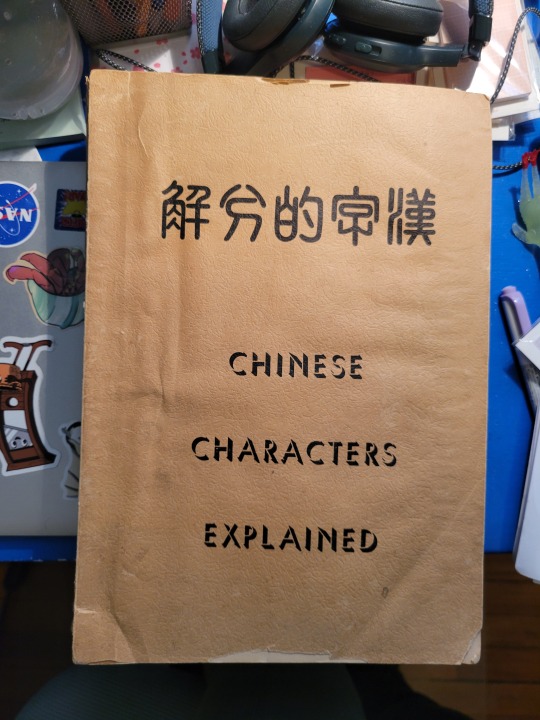

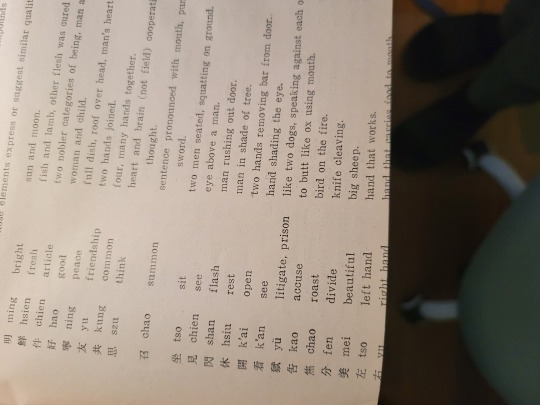
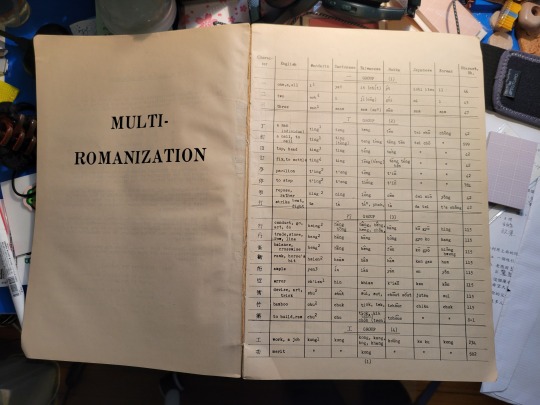
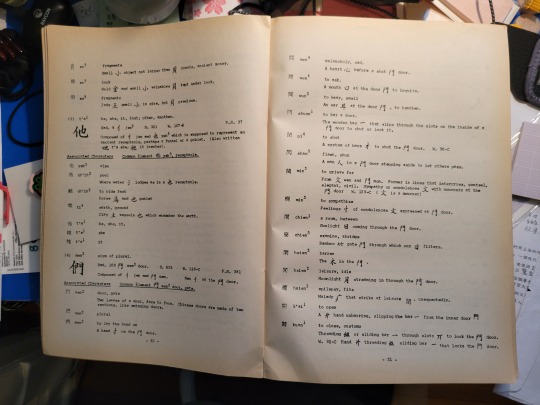
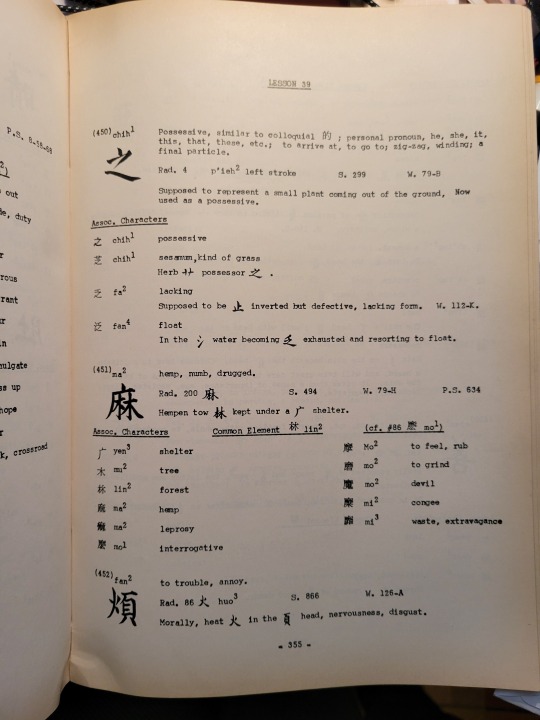
This book was also gifted to me by the nun who went to school with my grandma, and appears to also have been written by a nun! Based on what I've found from Google, this book was published in 1967.
Rather than a dictionary, this book is "a compilation intended as an aid in grouping and remembering [Chinese characters] with a view in acquiring a reading knowledge of Chinese"(p. iii). It aims to break down characters into radicals and giving similar/related characters. It's apparently the final installment in a 4 part Mandarin Course.
This book uses traditional characters. According to Google Books, the publisher is 光啓出版社, which is a Taiwanese organization. The book includes a very long table that has Mandarin, Cantonese, Taiwanese, Hakka, Japanese, and Korean pronunciations for (what seems to be) every character mentioned in the book. The intro mentions that this is so the course is more "accessible" for speakers of other East Asian languages.
Also, look at that printing error in the third photo! The text got cut off at the bottom of the page.
7. The Structure of Chinese Characters by John Chalmers (second edition, 1911)
bilingual
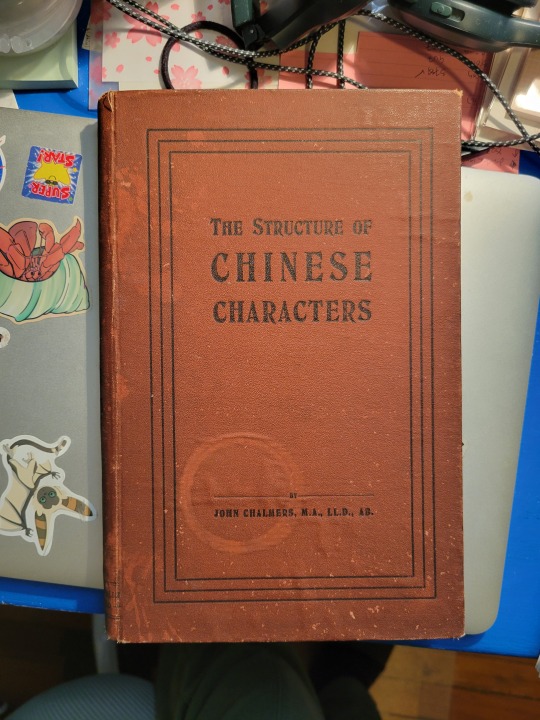
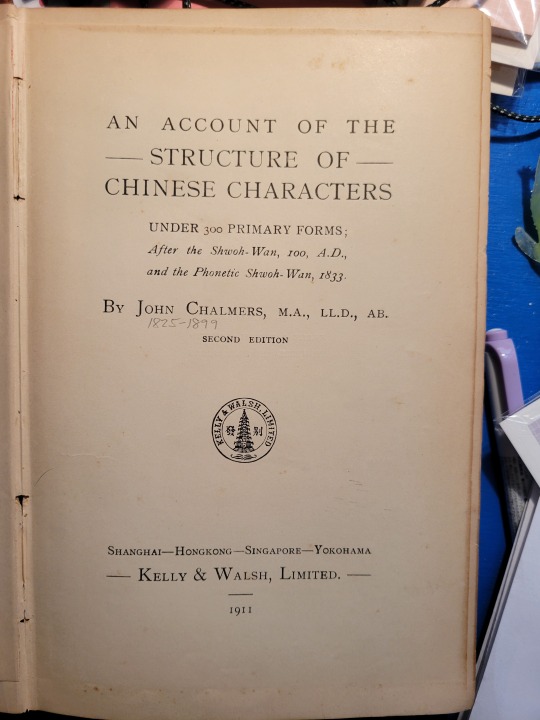
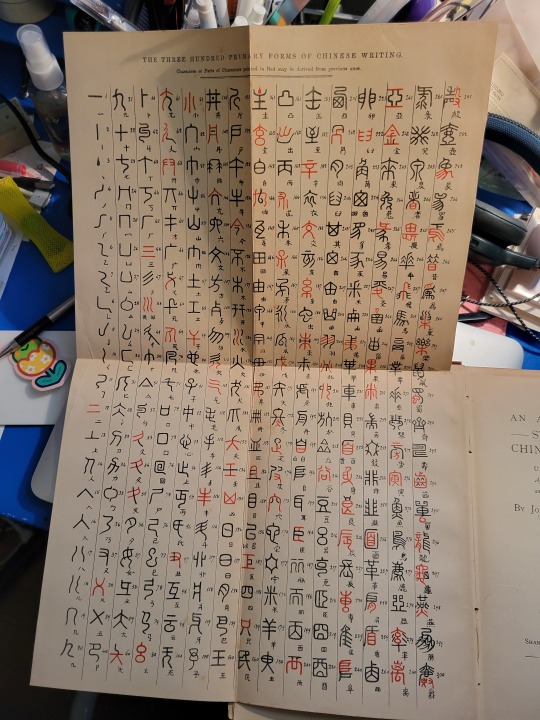
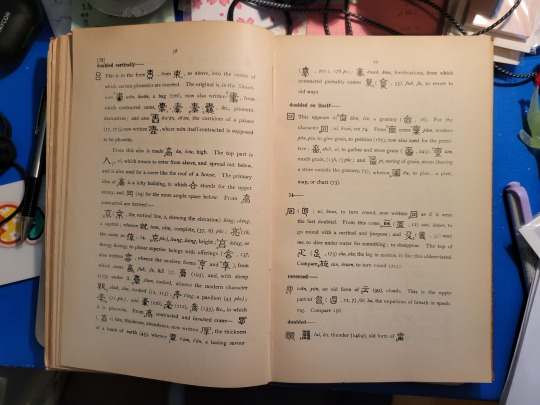
This final book is the oldest of the bunch, and was gifted to me by my boss's boss for some reason? She found it in a used bookstore apparently.
This book also uses traditional characters, because simplified characters just weren't a thing yet in 1911. This book is falling apart, and opening it stresses me out. It creaks whenever I open it.
Going by the title page, the full title of this book is An Account of the Structure of Chinese Characters Under 300 Primary Forms; After the Shwo-Wan, 100 A.D., and the Phonetic Shwoh-Wan, 1833. It was published by Kelly & Walsh, which was a Shanghai-based publisher.
Someone very kindly penciled in the years the author was alive: 1825-1899. John Chalmers was apparently a Scottish missionary (bc of course he was) who apparently popularized the term "Cantonese". This book that I own in particular was originally published in 1882.
It is, as the very long title suggests, an analysis and etymology of 300 common components
It also has a nifty fold-out of all 300 "primary forms" in seal script.
70 notes
·
View notes
Text

GUYS THIS HAS BEEN THE BEST WEEK OF MY LIFE I SWEAR. I THOUGHT THEY WOULDNT LET ME KNOW FOR A WHIIILE OMGOMG IM GOING TO TAIWAN
#studyblr#study blog#langblr#langblog#language learning#languageblr#chinese langblr#mandarin langblr#study abroad#taiwan#chinese language#mandarin chinese#mandarin studyblr#studyblr community#chinese studyblr#learning chinese#learn chinese#mandarin study#learn mandarin#studyabroad#exchange student#student life#uniblr#university#college
97 notes
·
View notes
Text
Speak DECENT CHINESE in 4 months - 8 easy tips
______
1. Have someone to guide you to get good pronunciation habits. It is almost impossible to re-learn bad habits later so make sure you get your pronunciation right from the beginning. I mean the pronunciation of the sounds, not the tones. Tones take more time to get used to and you can't rush it - but try the best you can. Some tutors don't bother too much about the pronunciation so make sure you find someone who is strict about that, you will be grateful later. Also get confident in pinyin, you will need it.
2. Understand the composition of the sentences. The word order is super easy and it stays the same all the time (the question and informative sentences have the same word order). I have a formula for the word order but I won't reveal it here, it is one of the secrets I keep for my students and people who use my materials.
3. Understand that there are no tenses in the sense we think about them in English and other languages. Learn to express future, potential future, finished action, change of state, experience in the past and circumstances of the event. See the difference between action verbs and verbs of state.
4. Learn to use modal verbs and conjuctions.
5. Build usable vocabulary based on the fact that everything in Chinese is interconnected.
6. Understand 就, 才,的 and 得
7. Don't learn grammar rules and words separately. Learn functional practical sentences that will serve you as examples of the grammar structures (then you just need to change the words in these sentences).
8. Develop your listening skills - that is very important. For that there are Youtube channels and podcasts on Spotify (and in my materials the audio part also plays an important role). You can listen to Chinese radio stations just to get the feeling of the language.
______
After 3-4 months you should feel pretty confident in normal conversations if you study regularly under competent guidance.
______
R-evolutionary learning materials and resources: https://linktr.ee/chineseffect
MAGIC PLAYBOOK for beginners
#learn chinese#learn mandarin#chinese langblr#mandarin langblr#edublr#mandarin#chinese#mandarin edublr#langblr#chinese vocabulary#mandarin chinese#chinese edublr#learning mandarin#learning chinese#study chinese#mandarin vocabulary#study mandarin#汉语#chinese studyblr#beginners chinese#chinese for beginners#learning tips#chinese tips#mandarin tips
244 notes
·
View notes
Text
Mandarin Chinese Learning Reccomendation! Jan/15/2023
I reccomend the website Chinese Grammar Wiki, when I started getting serious about learning mandarin I was 2 years into my studies but was at a basically beginner level because I had no idea how to study and get better at something like language learning, but this website definitely helped me out. Some days I would just open up the website and read through each article and it basically burned it all into my brain because just about everything I read on there I still remember today (I last used the website 5 or so years ago). The articles are super easy to understand and gives a concise description of how to use certain words without boring you to death. It was very good for my 14 year old brain at the time LOL. Give it a try :) #notsponsored
#easy mandarin#mandarin langblr#mandarin learning#learn mandarin#beginner mandarin#study mandarin#beginner chinese#study chinese#learn chinese#language learning resources
285 notes
·
View notes
Text
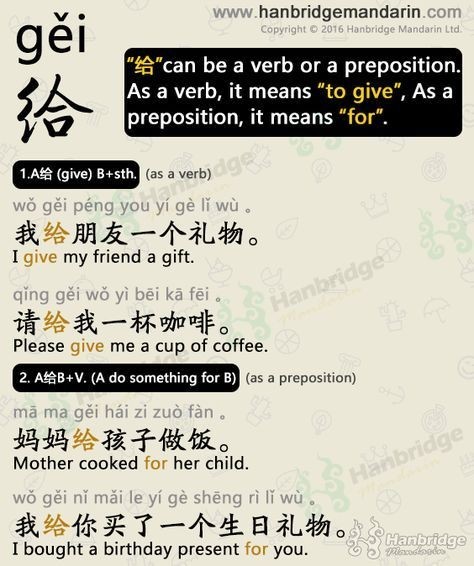
Guys, I swear the source website of this picture had helped me out so much both when I started learning chinese and now!
Link:
I don't usually recommend pinterest to find useful websites but I did find this website there somehow lol. Istg half the links of pinterest are unavailable or something.
#langblr#chinese langblr#mandarin langblr#mandarinblr#chineselangblr#chinese vocab#mandarin vocab#chinese vocabulary#chinese language#chinese studyblr#mandarin vocabulary#mandarin chinese#mandarin studyblr#mandarin#learn chinese#study chinese#chinese study#learn mandarin#study mandarin#learning mandarin#studying mandarin#langblog#language learning#languageblr#learning languages#zhongwen
203 notes
·
View notes
Text
Online Mandarin Tests!♡
hello sweeties, what's up?
i found a site with chinese tests to improve your study. check the list:
Pinyin: 1 | 2 | 3 | 4 | 5 | 6 | 7
Numbers: 1 | 2 | 3 | 4
Animals: 1 | 2 | 3
Body: 1 | 2
Family: 1 | 2 | 3 | 4
On and Under: 1 | 2
Colours: 1 | 2
Clothes: 1 | 2 | 3
if you want more, just search here !
hope it can be useful for your study and any questions you have don't hesitate to talk with me. 加油!♡

#chinese#learn chinese#learn mandarin#china#chinese girl#yuqi#gidle#langblr#study chinese#basic chinese#soft chinese#softchinese#orientalismx#hanyu#汉语#普通话#中国#学习汉语#hsk1#hsk2#chinese vocab#chinese grammar#chinese text#chinese quizz#chinese test
336 notes
·
View notes
Text

today's vocabulary : 洗衣粉 [xǐ yī fěn]
#language#studyblr#langblr#chinese langblr#chinese studyblr#mandarin#learn mandarin#中文#汉语#chinese vocabulary#study chinese#chinese characters#mandarin chinese#studying chinese#china
24 notes
·
View notes
Text
i emailed my mandarin teacher about my name change (both chinese and english) but she wants to wait to talk about my chinese one and give me feedback 😰
#studyblr#high school#school#study#studyspo#kazma does school#chinese#mandarin#learn mandarin#mandarin chinese#chinese name#new chinese name
16 notes
·
View notes
Photo

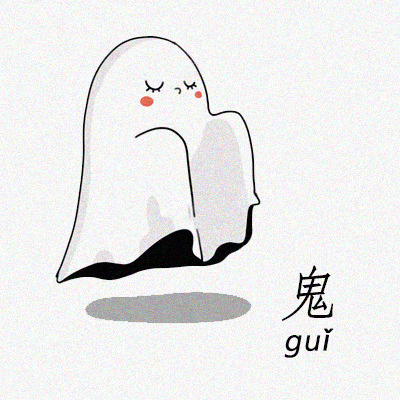

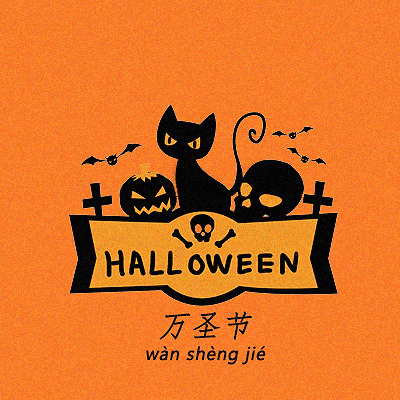
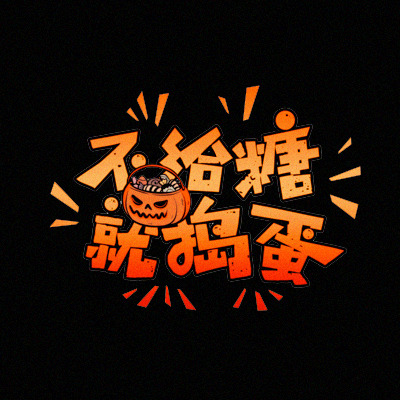
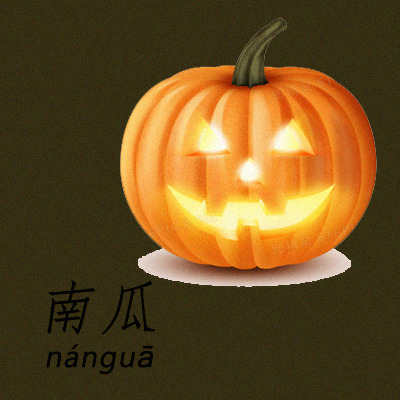

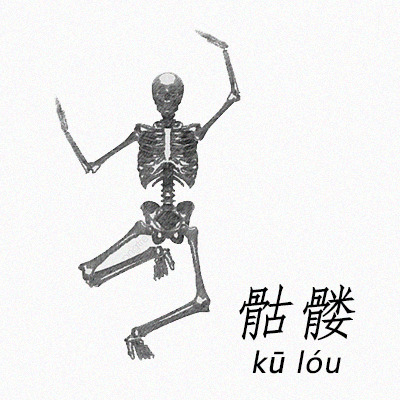

Trick or treat
不給糖,就搗蛋 | bù gěi táng, jiù dǎo dàn
为庆祝万圣节的来临,小孩会装扮成各种可爱的鬼怪向逐家逐户地敲门,要求获得糖果,否则就会捣蛋。而同时传说这一晚,各种鬼怪也会装扮成小孩混入群众之中一起庆祝万圣节的来临,而人类为了让鬼怪更融洽才装扮成各种鬼怪。
To celebrate the advent of Halloween, children will dress up as all kinds of cute ghosts and knock on doors from house to house, asking for candy, or they will trick or treat. At the same time, it is said that this night, all kinds of ghosts will dress up as children to join the crowd to celebrate the coming of Halloween together, and humans dress up as various ghosts in order to make the ghosts more harmonious.
#happy halloween#halloween#trick or treat#不給糖就搗蛋#china#chinese#learn chinese#learn mandarin#mandarin#langblr#learn languages#chinese langblr#chinese halloween#chinese vocab#chinese words#chinese texts#hsk#学习汉语#学习普通话#中国#orientalismx
72 notes
·
View notes
Text
Word of Honor Vocab - Episode 2
after much too long, here we go
若 (ruò) - as if; like
美若天仙
诚意 (chéng'yì) - good faith/sincerity
表明诚意
变数 (biàn'shù) - variable
此事变数很大
步法 (bù'fǎ) - footwork
你的步法很厉害
偏偏 (piān'piān) - lightly/airily; unrestrained
蝴蝶在花丛中偏偏飞舞
翩翩少年
仙 (xiān) - celestial being; immortal
凡人和神仙
眼疾 (yǎn'ji2) - eye trouble/ eye disease
我爷爷有眼疾所以它不看清楚
飘飘 (piāo'piāo) - to float about/to flutter
红旗飘飘
流风 (liú'fēng) - customs handed down from past generations
流风余韵
仿佛 (fáng'fú) - seemingly/as if
这事她仿佛已经知道了
轻 (qīng) - light (weight)
工作很轻
所谓 (suǒ'wèi) - what is called/what is known as; so-called
所谓团结,并非一团和气
他所谓的朋友都背弃了他
壶 (hú) - kettle/pot
壶里是开水
独酌 (dú'zhuó) - to drink alone
如果你很难过,你应该不独酌
尾随 (wěi'suí) - to tag along after
尾随其后
究竟 (jīu'jìng) - outcome/what actually happened
大家都想知道个究竟
妨 (fáng) - hinder/hamper; harm
你试一试也无妨
会妨大事
明示 (míng'shì) - to explicitly instruct
我明示你得做你的功课但是你还没做完了!
傻 (shǎ) - stupid/muddleheaded
吓傻了
剑 (jiàn) - sword
剑柄
拔剑
#as always corrections are welcome#most of the sentences are from pleco but where pleco had none i had to come up with some#i have two more vocab lists planned for word of honor and hopefully i get to them soon#m vocab#mandarin#chinese#mandarin studyblr#mandarin vocab#learn mandarin#learn chinese#chinese langblr#chinese studyblr#mandarin langblr#word of honor#shan he ling#山河令#langblr#chinese language#普通话
132 notes
·
View notes
Text
My latest obsession: The XX子 pattern
So what is XX子? Well I made that term up because I didn't know what else to use. As for what it means, Chinese has many nouns that end in 子, so they are of the form X子. Sometimes the character X can also be a verb. So in some cases, you can actually say you Xed an X子, and it will make perfect sense!
种种子 zhòng zhǒngzi
种 zhòng - to plant / to grow / to cultivate
种子 zhǒngzi - seed
扇扇子 shān shànzi
扇 shān - to fan
扇子 shànzi - fan
盖(上)盖子 gài gàizi
盖 gài - to cover
盖子 gàizi - cover / lid
扣(上)扣子 kòu kòuzi
扣 kòu - to fasten / to button
扣子 kòuzi - button
包包子 bāo bāozi
包 bāo - to wrap
包子 bāozi - bun / bao
钉钉子 dìng dīngzi
钉 dìng - to nail / to pin
钉子 dīngzi - nail
辫辫子 biàn biànzi
辫 biàn - to plait / to braid
辫子 biànzi - plait / braid / pigtail
As you can see, sometimes the tone of character X is different...but I feel like that could be a whole other post. I'm "collecting" more of these, so if you can think of any, let me know! I looked for a list online but couldn't find anything.
#nerdy language stuff#chinese#mandarin#mandarin chinese#chinese language#studyblr#langblr#language study#learning languages#language learning#chinese studyblr#chinese langblr#mandarin studyblr#mandarin langblr#study chinese#study mandarin#learn chinese#learn mandarin#studying chinese#learning chinese#studying mandarin#learning mandarin#foreign languages#language#languages#language blog#languageblr#language stuff#chinese vocab#mandarin vocab
367 notes
·
View notes
Text
Every wanted to tell someone to step on a lego in Mandarin? Here's how:
我希望你踩在乐高上。「我希望你踩在樂高上。」
(I've also seen 踩到樂高)
A favorite variation is 我希望你在漆黑的夜里一脚踩上乐高,光脚!「我希望你在漆黑的夜裡一腳踩上樂高,光腳!」
#langblr#mandarin langblr#chinese langblr#learn mandarin#learn chinese#mine#i am here to teach you useful phrases
56 notes
·
View notes
Text
looking for mandarin show/movie recommendations plsss
i currently watch street dance of china and used to watch the chuang series but i dont know how to branch away from the competition/survival shows
#studyblr#study blog#langblr#langblog#language learning#languageblr#chinese langblr#mandarin langblr#learning mandarin#chinese studyblr#learning chinese#learn chinese#chinese language#mandarin chinese#mandarin studyblr#mandarin study#learn mandarin#mandarin
77 notes
·
View notes
Text

山很高,海很深 /shān hěn gāo, hǎi hěn shēn/
MOUNTAINS ARE HIGH, SEAS ARE DEEP
________
Beginner?
MAGIC PLAYBOOKS
Intermediate?
WORDPLAYS
FREE 12 DAY MANDARIN CHALLENGE
#chinese#mandarin#learn chinese#learn mandarin#chinese langblr#mandarin langblr#edublr#langblr#mandarin edublr#chinese vocabulary#mandarin chinese#chinese edublr#study chinese#learning chinese#learning mandarin#mandarin vocabulary#study mandarin#中文#汉语#chinese studyblr#mountain#mountains#sea#scenery#nature#daoism#dao
21 notes
·
View notes